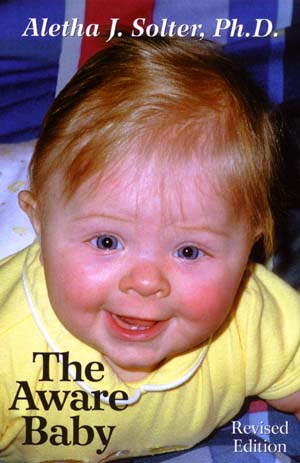How can I help my daughter remember to use the potty?
by Aletha Solter, Ph.D.
Question:
My two-year-old daughter has been interested and generally going in the potty at home for about two months, so I know she "gets it." One day she even climbed up on the big toilet and peed and pooped without my knowing. However, this only occurs as long as she's naked from the waist down. If she wears underpants, she apparently thinks she's back in diapers. NO success with undies on. I know she's young, and I swear I am not pushing (or bribing, etc.) but I wonder if anyone has any ideas for making the underpants-thing work. She can't go naked for the rest of her life! Thanks.
Answer:
It sounds as if your daughter is making great progress towards toilet training, but it does take some time for most children. I applaud you for not pushing or bribing her.
One thing you can do is to give your daughter underpants to wear that are one or two sizes too big. This will make it quick and easy for her to take them down to sit on the potty, and it will feel quite different from wearing snug diapers.
Another suggestion I have is to let your daughter decide each day whether she wants to wear underpants or diapers. You can explain to her that wearing underpants implies remembering to go to the potty. Then leave the choice up to her, while letting her know that there is nothing wrong with wearing diapers if she does not feel like taking on the responsibility of remembering to use the potty. She might choose to wear diapers on certain days or during certain outings when she doesn't want to bother about remembering to go to the potty. If you let her be in charge of the toilet training process in this manner, you may reduce the number of accidents she has while wearing underpants.
It is best to refrain from reminding your daughter to use the potty. Although frequent reminders may help temporarily in avoiding accidents, if you leave it up to her to remember, she will learn more quickly. Children learn best from their own mistakes. You can suggest that she use the potty before leaving the house, of course, but otherwise, I wouldn't say anything. Some parents adopt the habit of continually reminding their children throughout the day by asking, "Do you have to pee?" The children become dependent on the parents' reminders and don't learn to rely on themselves as soon.
It is best to treat "accidents" very casually without anger. All you need to say is, "Oops, I guess you didn't get to the potty in time. Maybe next time you will." You can convey confidence in her ability to learn. Then calmly clean her up. There is no need to make your daughter feel guilty or to force her to clean up her own messes.
It is important to remember that potty training is not usually mastered in one day. Even though children understand about toilet training, there are other factors involved. At first, remembering to use the potty requires a lot of concentration (sort of like driving a car the first time). There are new things to remember and do. When children become busy with other activities, or when they are feeling stressed, overstimulated, or tired, they easily forget new skills and regress temporarily into babyhood. This is perfectly normal. Growth occurs in uneven spurts with occasional reversals that can make it seem as if all is lost. But this is not usually the case.
About Aletha Solter:
Aletha Solter, PhD, is a developmental psychologist, international speaker, consultant, and founder of the Aware Parenting Institute. Her books have been translated into many languages, and she is recognized internationally as an expert on attachment, trauma, and non-punitive discipline.
Aware Parenting is a philosophy of child-rearing that has the potential to change the world. Based on cutting-edge research and insights in child development, Aware Parenting questions most traditional assumptions about raising children, and proposes a new approach that can profoundly shift a parent's relationship with his or her child. Parents who follow this approach raise children who are bright, compassionate, competent, nonviolent, and drug free.
For more information about toilet training, see Aletha Solter's book, The Aware Baby.
